![]()
By Treischel
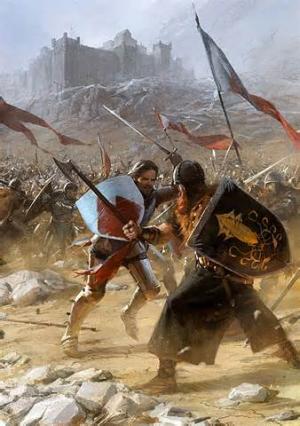
Battle Lines
(Tuscan Strombata with Couplet)
In lost lore of mighty knights of yesterday,
'Tis here adventurous hearts may seek a thrill.
Tacit thoughts of long ago and far away,
Carry dreams to pleasant setting on high hill.
Watching battle lines reflecting armor's shine,
Whence nervous warrior pass a flask of fine wine.
'Tis ownership of land, causing much ado
About which King's claim is false and which is true.
Keep small the cost of blood and lost life, we pray.
So that mighty men may live another day.
| Author Notes |
Medieval battle over land caused strife throughout ancient Europe.
This poem is a Tuscan Strombata with a closing rhyming couplet. Tuscan Strombata ...4 couplets, 11 syllables per line, ababccdd rhyming. This artwork is from Yahoo Images |
![]()
By Treischel

Hangman's Noose
As whirlwinds blow across the plains,
And earth's pounded by torrid rains,
As lightning flashes blinding light,
And thunder rolls through dark of night,
On he rides, in full fleeting flight.
Fearing hangman's noose.
'Twas murder in cheap gambling den
That caused this instant flight just when,
He feels law posse on his tail,
And so he braves the pounding hail,
Upon this wet and treach'rous trail
Fearing hangman's noose.
He should have grabbed that poker pot
After that cheating Sharp was shot.
Now he's feeling empty handed,
As an outlaw, he's been branded,
Soon to be both broke and stranded.
Fearing hangman's noose.
This hombre knows, there's just one chance,
To run and hide from circumstance.
He thinks it's safer "Down Below",
Since out of here he has to go,
So now he's off to Mexico.
Fearing hangman's noose.
But Fate's fortunes were not as planned,
Caught him crossing the Rio Grande.
Despite his poignant mercy plea
They hung him from the nearest tree.
Now there's no longer need to be...
Fearing hangman's noose.
| Author Notes |
Not a good day in the old West
This poem has 8 syllable count and aabbb rhyme scheme, with repeating refrain. Lynching was often the case in the Old West when a posse caught their criminal. Swift Justice (hopefully). Posse - a group, deputized by the lawman to chase criminals. Card Sharp, or Sharp, was a professional gambler. Frequently accused of cheating. Branded here means "named as", or "identified as". Hombre is a Spanish word for man, in this case a murderer. "Down Below": people in the USA often referred to Mexico as "Down Below", in those days. Rio Grande is the river that separates the US from Mexico. This artwork is from Yahoo Images. |
![]()
By Treischel
Forest Fantasy
(Sonnet, non-rhymed)
I hold aloft a swirling candy cane.
'Twas on a tree, assume it was a gift.
It nestled there twixt needles of a pine
All shriveled and abandoned by a brook.
I pondered here just how this came about,
This morsel of some past and happy time.
A now forgotten trinket that I find
Amongst the grizzled needles of that pine.
And soon I stripped it of its meager shell,
To slip a languid swipe across my tongue.
A minty flavor met my favored taste,
With that small test, too soon the rest was gone.
Then suddenly I swooned, and as I fell,
I heard a lilting laughter from the knell.
| Author Notes |
A little fantasy to liven things up. Not sure where this came from, just popped out of me.
This poem is a Sonnet, but written without rhyme. it is written in iambic pentameter, making it a blank verse. Thank you for the wonderful artwork, Forest Nymph by JaymeM on FanArtReview.com |
![]()
By Treischel

Sharp Teeth
(A Triolet)
Sharp teeth meant to rend the tender
Bodies of unsuspecting fools.
Encounter means no surrender.
Sharp teeth meant to rend the tender,
When seen, seek out a defender.
Beware the fatal smile that drools,
Sharp teeth meant to rend the tender
Bodies of unsuspecting fools.
| Author Notes |
Just Saying
This picture was taken by the author at a Dinosaur Show in Downtown Minneapolis in December 2012. |
![]()
By Treischel

Dancer
(A Katie21 Poem)
Along
The hills
The plains
He
Dances
To the beat
Of
The Earth
The sound of the wind
Bird songs
Life
| Author Notes |
A Dancing Spirit
This is a Katie21 poem. It is free verse with exactly 21 words. This photograph is of a tree root I found on the Great Plains at Blue Mounds State Park in Southeastern Minnesota. Near the buffalo herd. It looked, amazingly to me, like a dancing Indian spirit. I wrote this poem to this spirit. It will become one of my Animated Stills Poetry collection. |
![]()
By Treischel
The shock that it sent through my body was amazing.
I never felt such electricity before.
It was as if my lips were melting into a satin smooth pillow of billowy cream that tingled with sensuous taste, but fired volcanic eruptions into my brain.
That new model 75ZX cyborg female is something else.
Oh my!
| Author Notes | Thank for the artwork Heavy Metal by Johnny Gora of FanArt Review |
![]()
By Treischel

I
Celebrate
The rising of the sun in the sky.
Then pay tribute to the four winds,
Ki
Yii,
Ki
Yii.
Dance
Like the eagle soaring
High,
Entranced by the rhythm of the drum,
Ta
Dum,
Ta
Dum.
So
Ho,
I
Go.
So
Ho.
Ta
Dum,
Ta
Dum.
My feet
On Mother Earth
Pound the rhythms of New Birth,
As I celebrate the rising of the sun.
| Author Notes |
I have great respect for Native American Culture
This is a Totem Poem. The verse is somewhat shaped like a totem Pole. I took this picture of a statue that is in Bemidji Minnesota. This statue is still, yet animated in dance. This poem will become one of my Animated Stills Poetry Collection. |
![]()
By Treischel
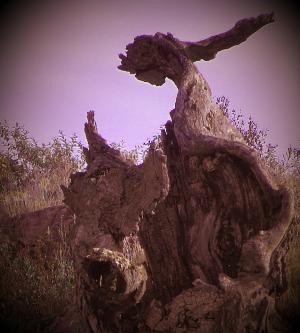
Firebird
(A Sonnet)
Oh Firebird, of myth and ash,
Your purpled plumes rise from the flames,
And like the heat returning sun,
Renewal forms your mythic claims.
Oh Phoenix, formed from fire's force,
Your legend burns across the sky,
In trails of smoke and glowing arch,
On toasted wings that make sparks fly.
Oh Benu glyph of ancient myth,
In resurrection of the soul,
Set free the purgatory lost
Their spirit cleanse to make them whole.
And once their essence has renewed
Feed them with your spiritual food
| Author Notes |
This poem is about rebirth, resurrection, renewal as symbolized by the Firebird of myth and legend, that is know in many cultures. Known to the Native Americans as the Firebird, interestingly enough, that's also what the Russians called it. Of course many believe the Native Americans came across the frozen Bearing Straights, right after the last ice age ended, from Mongolia.
The Ancient Greeks had their legend of the Phoenix. Ancient Egypt had a similar legend of the Benu. They were also associated with the color purple, and considered royal in nature. Due to it's characteristic of resurrection, early Christians adopted it as a symbol for Jesus Christ. There are many other examples in other cultures. The Persians had the Anka; Turkish had Kerkes, Tibetians had the Me byi karmo, and the Chinese had the Fenghuang. I tried to blend some of these mythologies into the poem. Purgatory is believed to be a place between Heaven and Hell, where blemished souls, not so evil as to be damned, await their cleansing, so that they may be allowed into Heaven. Some believe that Christ released them upon His death and resurrection. This poem is a Sonnet, written in iambic tetrameter using the abcb rhyme scheme. This picture is actually a gnarled tree stump that I came across in Blue Mounds State Park of Southwestern Minnesota on the Great Plains, in August 2012. It reminded me of a bird sitting on a perch in the foreground (look for a wing)ready to fly out of the smoke that is billowing and rising up behind it. Although a still object, it looks animated to me. It will become one of my Animated Stills collections of poems. Animated stills are poems where inanimate objects take on human, animal, or spirit forms, traits, or articles. They are derived from Photographs I have taken, that have moved me to write a poem associated with it. |
![]()
By Treischel

Too Timid to Dance
(Worst Country Western Ever Written)
I am totally out of place.
I just can't face
All your daunting beauty and grace.
Yup, outa place.
At love and romance
I don't have a chance.
Too timid to dance.
Even embrace.
I'm feelin' blue.
Oh, what can I do!
'Bout you! 'Bout youuuu!
Could really learn a thing or two,
By watching you.
A thought completely overdue.
I know it's true!
I'm such a bleeding heart,
It's tearin' me apart!
I don't know where to start!
Start lovin' you.
I'm feelin' blue.
Oh, what can I do!
'Bout you! 'Bout youuuu!
| Author Notes |
I wrote this for the Worst Country Western Song Ever Written contest, but missed it. Thought I'd post it anyway. Hope you have a good laugh.
By me and the Cat Scratch Singers at High Yowl Records (LOL). Picture is from Yahoo iImages |
![]()
By Treischel
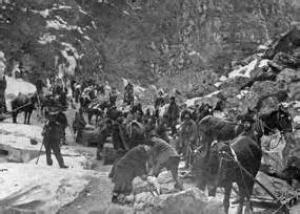
Alaska Gold
Past peaks of snow does water flow,
While pushing pale cold thrusts of ice.
Rocks tumble slow that carry gold
In beds as rich as dreams entice,
Then gold fever strikes.
In hearts of men the Northland calls
With echoed promises of wealth,
Past waterfalls and slippery walls,
Disputes many their hardy health,
When Gold fever strikes.
Alaskan nights are bitter cold
It only sanctifies the bold
With yearning for the Yukon gold
For they've been struck by Lady Luck
And hearken to her heavy draw,
With strong desire to find a buck,
In wilderness they scrape and claw,
When Gold fever strikes.
Klondike is a gold blessed river
Where hundreds go to claim their stake.
Pans and sluice they'll shake and shiver,
With dreams of all the gold they'll take,
When Gold fever strikes
Alaskan nights are bitter cold,
It only sanctifies the bold,
With yearning for the Yukon gold.
If they pass through the Chilkoot Trail,
And make it to the cherished goal.
The fates decide who wins or fail
In layers deep within the hole,
When Gold fever strikes.
It matters not how hard they try
Their plight depends on claim and choice
Many will try and many die
Sad tune that sings gold fever's voice,
When Gold fever strikes
Alaskan nights are bitter cold
It only sanctifies the bold
With yearning for the Yukon gold
Past peaks of snow does water flow,
While pushing pale cold thrusts of ice.
Rocks tumble slow that carry gold
In beds as rich as dreams entice,
Then Gold fever strikes.
| Author Notes |
In 1896 Gold was discovered in Alaska that set off an amazing gold rush where it is estimated that 100,000 prospectors migrated there to strike it rich, but, of those who set out, between 30,000 and 40,000 made it there. Many turned around, many died on the way. A few struck it rich, but the majority went in vain.
There is no formal name to this poem's format. It just came out of me that way, for better or for worse. It has a repeating refrain attached to abab rhymed quatrains, with an interjected 3 line tercet. Syllable count is 8. Most, but not all, stanzas are Iambic. The picture is from Yahoo Images. |
![]()
By Treischel

Abraham Lincoln
(5-7-5 Suite)
Lincoln, President
divisive when elected
Civil War erupts
proclaimed, Honest Abe
for backwoods integrity
loved telling tall tales
wore a stovepipe hat
a thin beard under his chin
memorable look
with diversity
assembled mixed cabinet
"A Team of Rivals"
shouldered war's burdens
with melancholy resolve
freed slaves from bondage
blood on his conscience
but determined to succeed
held to the hard course
expressed emotions
on the famous battlefields
Gettysburg Address
preserved the Union
at great personal expense
assassinated
| Author Notes |
Lincoln was a man of great personal courage and integrity.
I quoted "A Team of Rivals" in deference to the book by Doris Kearns. This poem is a set of 8 interlinked 5-7-5 Poems. Line 1: 5 Syllables Line 2: 7 Syllables Line 3: 5 Syllables Lack of punctuation intentional by the author The picture is from Microsoft ClipArt. |
![]()
By Treischel
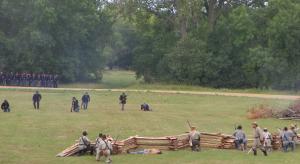
When Bugles Blow
(Quintrains)
Two sides hopelessly divided,
Northern blue, Southern grey.
The question of slavery decided
As angry aimed guns blaze away,
When bugles blow.
The troops are all smartly marching.
The enemy's dug in.
While the cannonballs are overarching,
It's difficult to know who'll win,
When bugles blow.
The ground between is choking
With mortal clenching fear.
Officers, to the charge provoking
Reluctant troopers at the rear,
When bugles blow.
The Generals claim their victory
Depending which side yields,
But, those rewarded for their bravery,
Lay dead on bloody battlefields,
When bugles blow.
| Author Notes |
Often, during the Civil War, both sides claimed victory after the battle. I came across a Civil War re-enactment at Pipestone, Minnesota in August, 2012. The battle scene gave me these thoughts.
This poem is a series of Quintrains (a poem with 5 line stanzas). I gave this one an unusual syllable count as I was experimenting with long/short tempo. The count of each verse is: 8/6/10/8/4. The rhyme scheme is: ababC dedeC fgfgC hihiC , where C is a repeated refrain. This is a photograph that the author took at the event. |
![]()
By Treischel

They came trailing across the endless Plain
Seeking for their fortunes, seeking gain.
Settlers, Preachers,and Outlaws - Pioneers all.
The Great movement West, they answered the call.
With cracking whips and their horses staining,
They battled fatigue, searing heat, and constant raining.
Their cracked creaking wheels crushing down the sod,
On and on and on they fearlessly trod.
Then in the green Meadow they suddenly spied,
Timber stretched over with died Buffalo hide.
Across those bent grasses was a Tee Pee abode
Setting Pioneers to ponder the risks of this road.
The lead wagon driver pulled at his horses traces
While scanning the landscape for friend or foe faces.
The Wagon Train stopped, but the Natives were gone,
So the Trail Master yelled out - "Move ON, Move On"
| Author Notes | I took this picture at Shetek State Park in Southwestern Minnesota. I was out walking a back trail and saw this teepee across the field. The combination of the prairie land and the teepee inspired me to feel something the pioneers may have felt while crossing this land in the 1800s. |
![]()
By Treischel
The Storm
(A Tale in 8/6 Meter)
I heard the rain come beating down.
Late last night, while I slept.
As mighty thunder shook the ground,
And darkened storm clouds wept,
Another boom, shuttered the room,
Made car alarms go off.
Instilling fearful thoughts of doom,
My wife let out a cough.
I was awakened by the sound
That echoed in my head.
My smiling sleep turned to a frown
And I was filled with dread.
It made my body toss around
And get up out of bed,
To window, went to view the scene,
Amazed at what I saw.
When lightning flashed, the sky turned green,
My jaw dropped down in awe.
For coming down the darkened street
Was a twisting funnel cloud.
Its devastation broke and beat
Objects it could enshroud,
Like trees, and roofs, and even cars
Were tossed about like toys.
Its presence blotted out the stars.
Beneath, a dreadful noise.
I woke the family from their dreams
And sought a safety place.
Above us howled the wind borne screams.
We prayed for saving grace.
While all we owned, just blew away
We were all truly blessed.
Stayed safe to still be here today.
We can replace the rest.
| Author Notes |
Just a fictional poem about a storm. To some families, this is very real.
This poem is just simply written in an 8/6 syllable count with an abab rhyme scheme. The cover art, for which I am grateful to Simonka of FanArt Review is called Twister. I am pleased to have it enhance my verse. |
![]()
By Treischel

Battle of the Little Bighorn
(A Dactyl Poem)
Colonel George Custer's famous fight, 1876
Native strength was misunderstood, error he couldn't fix.
Big mistake, men gotten killed, in less than a single hour.
Crazy Horse, Sitting Bull, there with overwhelming power.
Brazen man, golden hair, aggressive in battle manner,
Civil war renowned, rode forth under 7th Cav's banner.
Major Marc Reno, and Captain Benteen, were at his side.
Forward they rode, as a troop on a flagrant arrogant ride.
High above Crow's Nest peak, Custer's two Indian scouts hide,
Viewing an Indian pony herd, back they quickly ride.
Ordered by Terry to wait near mouth Little Big Horn
Couldn't restrain vainglorious pride, called attack that morn.
Scouts had seen village of Sioux far off, camp of unknown size,
Custer had planned to take camp's sleeping warriors by surprise.
Fast fought attack, would yield hostages used as human shields,
These were the plans, as the troops raced across the grassy fields.
Splitting his forces to three groups, planning a pronged attack.
Reno made Southern approach, where the warriors pushed him back.
Benteen had wagon train, full of supplies, reinforcements,
Custer broke off to attack without command's endorsements.
With 265 men, he hoped to hit from further North,
Worried his quarry would scatter too fast, he sallied forth.
Foolish in confidence, knew not the odds he really faced,
Nor of the angry attitude, of Lakota that he chased.
Reno was pushed into the woods, defending the river.
Benteen came supporting his battle that seemed forever.
Three days it raged, 340 men, dug in along the bluff.
Terry and Crook's reinforcements came, barely soon enough.
Custer went to different fate than those in Reno's command.
His own sad destiny became known as "Custer's last Stand".
Details are hazy, all of them died, so little is known
Here are the facts as archeological sites have shown.
Custer chose Medicine Trail Coulee, where to ford the creek,
But the attack was rebuffed, Sitting Bull on higher peak,
Forcing the smaller Calvary troop retreat up the hill.
Dismounted, surrounded, Crazy Horse got in for the kill.
"Golden Hair's" furious fight, bullet shot to chest and head.
With him, all men of the Calvary, were stripped, and lay dead.
Whiteman's greed epitomized what caused this infamous stand.
Sitting Bull's wrath, rightly released at theft of sacred land.
Redman won, his culture done, his rights were soon overrun,
Lost rising tide, torturous ride, when settlements begun.
No mercy found, who fought to survive, from this battleground,
Heartache and pain for natives remain, ghosts still hang around.
| Author Notes |
The Battle of the Little Bighorn is also known as Custer's Last Stand. It is an iconic battle in many ways. It represented the last major battle of the Sioux Indian wars. It was fought after the US broke its promise that the sacred lands of the Black Hills would belong to the Native Americans forever, when gold was discovered there. There were thousands of troop deployed to round up what they thought would be 800 Indians who had left the reservation. Custer was a small part of the overall deployment. He started with more the 700 men under him, but split them up in order to attack.Custer unknowingly faced thousands of Indians, in addition to the 800 non-reservation "hostiles". All Army plans were based on the incorrect numbers. Custer was more concerned with preventing the escape of the Lakota and Cheyenne than with fighting them. He intended to capture women, children, the elderly or disabled to serve as hostages and human shields. Custer's battalions intended to "ride into the camp and secure noncombatant hostages" and "force the warriors to surrender". Those plans and incorrect estimates proved fatal.
Because of his long, blond, curly hair, the Native Americans called him "Yellow Hair" or "Golden Hair". There were actually 3 contingents of military forces in the field at that time. Gibbons had six companies of the 7th Infantry and four companies of the 2nd Cavalry. Crook had column of ten companies of the 3rd Cavalry, five of the 2nd Cavalry, two companies of the 4th Infantry, and three companies of the 9th Infantry. Terry had twelve companies of the 7th Cavalry under Lieutenant Colonel George Armstrong Custer's immediate command, 5 Companies of the 17th U.S. Infantry, and the Gatling gun detachment of the 20th Infantry. Custer was to scout and locate the "hostiles", then wait for the rest at the mouth of the Little Bighorn river. This poem is my first attempt to write a Dactyl poem. In quantitative verse, often used in Greek or Latin, a dactyl is a long syllable followed by two short syllables, as determined by syllable weight. In accentual verse, often used in English, it is a stressed syllable followed by two unstressed syllables. For this poem I tried to maintain a line with a 14 count meter with an abab rhyme scheme and a cadence like: Dum-da-da Dum-da-da Dum-da-Dum-da The picture is courtesy of Yahoo Images. |
![]()
By Treischel
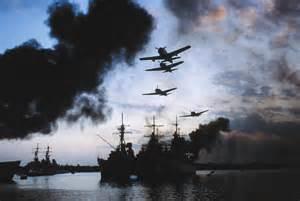
Pearl Harbor Day
(A Cole's Rhythm Poem)
"The day that shall live in infamy"!
Three hundred fifty three
Aircraft fighters from Japan's navy
Sunk ships below the sea.
Rest in Peace!
US battleships before the dawn,
No idea war was on,
Caught unaware once put upon.
Sunk - to the bottom drawn.
Rest in Peace!
December seventh in Forty One
Is when it had begun.
The planes came out of the rising sun.
2402 were done!
Rest in Peace!
They decimated the US Fleet.
Devastation complete!
Pearl Harbor attacked, then fast retreat.
A horrible defeat!
Rest in Peace!
With that, a GIANT is woken up,
Then starts the war buildup,
And gets Japan, and Nazi Europe,
To drink their bitter cup.
Rest in Peace!
| Author Notes |
The attack on Pearl Harbor by the Empire of Japan on Sunday, December 7, 1941 brought the United States into World War II. The Japanese flag and the symbol of Japan is the rising sun. The planes literally and figuratively attacked from the rising sun. The attack commenced at 7:48 a.m. Hawaiian Time. The base was attacked by 353 Japanese fighters, bombers and torpedo planes in two waves, launched from six aircraft carriers. All eight U.S. Navy battleships were damaged, with four being sunk. All but one were later raised, and six of the eight battleships returned to service and fought in the war. The Japanese also sank or damaged three cruisers, three destroyers, an anti-aircraft training ship, and one minelayer. 188 U.S. aircraft were destroyed; 2,402 Americans were killed and 1,282 wounded. Important base installations such as the power station, shipyard, maintenance, and fuel and torpedo storage facilities, as well as the submarine piers and headquarters building (also home of the intelligence section) were not attacked. Japanese losses were light: 29 aircraft and five midget submarines lost, and 65 servicemen killed or wounded. The entire attack lasted 96 minutes. Source: Wikipedia.
This poem is a Cole's Rhythm Poem. COLE'S RHYTHM: New style created by Gungalo, Saturday, July 8, 2006. Named for collector1 here on Poetry.com. Syllable count is 9-6-9-6-3 for each verse. Rhyme scheme: aaaaR bbbbR ccccR ddddR. The "R" is a 3-syllable refrain and each should rhyme the other in every verse. You can have as many verses as you want. This photograph is courtesy of Yahoo Images. |
![]()
By Treischel

Echoes
(Free Style)
Fields of freedom
| Author Notes |
Just an Echo of the Past, Bison on the plains of Southwestern Minnesota.
Photograph by the author himself. |
![]()
By Treischel

What princely prancing greets proud battle lines,
In gleaming armor and fine feath'red lace,
Convinced in heart and soul of cause divine,
Held steady ready firm in ordered place.
And oft' came bugle's shrill clarion call.
Hark knights on horse alerted to its sound,
That pounded forth with fierce voice, one and all,
'Midst thund'rous sounds of hooves each churning ground.
In wild abandon, flew into the fray,
Where death stalked fields of woeful blood and gore.
Here panic plagued fate ruled the daunting day.
Hence, many died on sands of foreign shore.
Though victor and foe wrought what blood was shed,
The outcome meant naught to the quaking dead.
| Author Notes |
For the contest
Corrected iambic post contest. First Quatrain: The Pomp and Pageantry of War. How glorious and just it seems. Second Quatrain: The charge. Battle engaged. Third Quatrain: The Reality of War. Panic, blood, gore, death. Couplet: To Victor and foe the cost is great. To the dead and dying , it is meaningless. The artwork is courtesy of Yahoo Images |
![]()
By Treischel
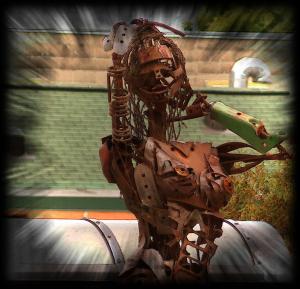
Woman of Steel
(A Triple Interlinked Triolet)
When chanced upon perfect woman of steel,
My thoughts were that I had become insane.
The possibility seemed too unreal,
When chanced upon perfect woman of steel.
But I must admit certain appeal.
To my surprise, it couldn't be more plain,
When chanced upon perfect woman of steel,
My thoughts were that I had become insane.
When chanced upon perfect woman of steel,
Had hidden history I didn't reveal.
Things, from a loved one, you shouldn't conceal.
When chanced upon perfect woman of steel,
She broke under my haphazard ordeal,
This powerful woman that then wouldn't heal.
When chanced upon perfect woman of steel,
Had hidden history I didn't reveal.
When chanced upon perfect woman of steel,
I never imagined I'd cause her pain.
She felt raw emotions I didn't feel.
When chanced upon perfect woman of steel,
Too me it was small, to her a big deal,
A powerful force that ran through her brain.
When chanced upon perfect woman of steel,
I never imagined I'd cause her pain.
| Author Notes |
Woman of Steel is every woman.
Women are strong, but they can break. Once, in our early marriage, my wife and I went on a Marriage Encounter weekend. One of the exercises was to tell your spouse a deep dark secret - something you've never told anyone else ever before. Well, I was honest. That was a mistake. I was inspired to write this poem by Gungalo poem, Said I Swear. The challenge was irresistible, but I changed around her sequence to fit my story. This poem is a series of three interlinked Triolets. A Triolet poem is an 8 line poem with a fixed format and repeating lines. Line one and two get repeated. Line one repeated on line four and seven. Line two repeats on line eight only. There is also a fixed rhyme scheme of only two rhymes (a & b). The scheme is: ABaAabAB, where the capital letters represent the repeated lines. For this poem, there are three separate Triolets, with the same A refrain is repeated throughout, but the repeated second line varies in the second and third stanzas. In the first Triolet the B line is repeated as normal, but in the third one, there is a new repeated line of B2. The second triolet replaces the B line with a second A line, becoming A2, and therefore, that stanza becomes mono-rhymed with two different repeating lines. So, that all can be expressed in the following rhyme scheme format: ABaAabAB AA2aAaaAA2 AB2aAabAB2 This photograph was taken by the author of a statue located in downtown Bemidji, Minnesota. I modified it a bit to create the image for this poem. |
![]()
By Treischel
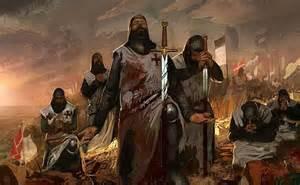
Kneeling Knights
(A 5A Poem)
Kindly knights kneeling
kept knobby knees keen
knowing kindness keeps
| Author Notes |
Knights pray to protect the pilgrims to Jerusalem in the middle ages. After the First Crusade recaptured Jerusalem in 1099, many Christian pilgrims travelled to visit what they referred to as the Holy Places. However, though the city of Jerusalem was under relatively secure control, the rest of outlaying area was not. Bandits abounded, and pilgrims were routinely slaughtered, sometimes by the hundreds, as they attempted to make the journey from the coastline at Jaffa into the Holy Land. In 1120, the French knight Hugues de Payens approached King Baldwin II of Jerusalem and Warmund, Patriarch of Jerusalem and proposed creating a monastic order for the protection of these pilgrims. The Order, with about nine knights including Godfrey de Saint-Omer and Andre de Montbard, had few financial resources and relied on donations to survive. The impoverished status of the Templars did not last long. Pope Innocent II's papal bull Omne Datum Optimum exempted the Order from obedience to local laws. This ruling meant that the Templars could pass freely through all borders, were not required to pay any taxes, and were exempt from all authority except that of the pope. With its clear mission and ample resources, the Order grew rapidly. Source Wikipedia.
This is a 5A Poem. The "5A" format style was developed by Fanstorian DRG24. The 5A is composed of three lines: Line 1 - 5 Syllables Line 2 - 5 Syllables Line 3 - 5 Syllables All lines must have TOTAL alliteration. Lines can be chosen in any order. Either the total poem can have all words with the same alliteration, or each line may have a different alliteration letter. For example, line one might have B alliteration, line two S, and line 3 T. Either way is acceptable. The "5" stands for the five syllable count while the "A" stands for the Alliteration. Picture from Yahoo Images |
![]()
By Treischel

Cannon
(A Lantern Suite)
Flash
Blinding
Hot fire belch
Smoke leaves Barrel
Blast!
Sound
Big noise
Ear Splitting
Loud concussion
Boom!
Gun
Cannon
Balls and shells
Heavy Metal
Death!
War
Weapons
Mass power
Dominant will
Hate!
| Author Notes |
The invention of cannons was a strategic game-changer in war. This on was part of a Civil War re-enactment held in Pipestone, Minnesota during August, 2013.
This poem is a suite of 4 separate Lantern Poems. A Lantern poem is a Japanese short poem describing a syllable noun. It has 5 lines. it starts with 1 syllable increases to 4. Then the last line has 1. The syllable count is: 1/2/3/4/1. It must be centered, then have one syllable chosen to serve as a topic. Have the noun in the 1st to 4th syllable described then have one that can be a reinterpretation or a synonym. The Lantern poem takes the form of a hanging lantern, going from short to wider as the poem goes on, and then becoming short again in the final line. The purpose of the Lantern poem is to illuminate the subject and re-imagine or personalize it for the reader, not just to simply define it. This picture was taken by the author himself. |
![]()
By Treischel

Culture Clash
(A Rondeau Redouble with Envoi)
A proud people lived on the plains
Lead by lessons learned long ago
Little of horseman's myth remains
Lived free as wolf and buffalo
Geological records show
These historical ice-age strains
Comanche, Sioux, Arapaho
A proud people lived on the plains
Living off what the land contains
Following vast herds as they go
Their teepees kept off cold and rains
Lead by lessons learned long ago
Tumbled in tragic tale of woe
When life was changed by wagon trains
From a culture they didn't know
Little of horseman's myth remains
Disregard of value caused pain
Guns and numeric overflow
Near extinction with tribe distain
Lived free as wolf and buffalo
A proud People
In anguish the ancestral spirits cried
As these majestic cultures nearly died.
"Enesta!
Tsigoti galvladi atloyadi. "
| Author Notes |
"Enesta!
Tsigoti galvladi atloyadi." Cheyenne words from Cherokee dictionary: Enesta - Hear Tsigoti - I see Galvladi - Heaven Tsigoti - cry Rough Translation: "O Hear! I see heaven cry." The arrival of Europeans to the Americas was a true clash of cultures. Since the end of the 15th century, the migration of Europeans to the Americas has led to centuries of conflict and adjustment between Old and New World societies. Many Native Americans lived as hunter-gatherer societies and told their histories by oral traditions; Europeans therefore created almost all of the surviving historical record concerning the conflict, and of course with their own spin on it. Native Americans suffered high fatalities from contact with Eurasian diseases to which they had not acquired immunity. Estimates of the pre-Columbian population of what today constitutes the U.S. vary significantly, from 1 million to 18 million. As American expansion reached into the West, settler and miner migrants came into increasing conflict with the Western tribes. These were complex nomadic cultures based on horse culture and seasonal bison hunting. Smallpox epidemics in 1780 - 1782 and 1837 - 1838 brought devastation and drastic depopulation among the Plains Indians. War, disease, and a deliberate policy to eliminate their food source by eliminating the buffalo herds, nearly made these cultures extinct. This poem is a Rondeau Redouble, It is a poem with a very complex fixed format. It is written on two rhymes (the a and b rhymes), but in five stanzas of four lines each and one of five lines that repeats a portion of the first line of the poem. Each of the first four lines (which due to the a and b rhymes will be identified in the following stanzas as A1, B1, A2 and B2) get individually repeated in turn once in the following stanzas by becoming successively the respective fourth lines of stanzas 2, 3, 4, & 5; and the first part of the first line is repeated as a short fifth line to conclude the sixth stanza. The stanzas each carry an abab rhyme scheme. So with the repeat line shown in numbered capitals, this can be represented as - A1,B1,A2,B2 - b,a,b,A1 - a,b,a,B1 - b,a,b,A2 - a,b,a,B2 - b,a,b,a,(A1). This poem can have any meter. This Picture was taken by the Author himself at a state park in August, 2012 while camping near Pipestone, Minnesota. |
![]()
By Treischel

A Pirate's Tale
(A Crown of Heroic Sonnets)
I.
And now the gibbet and the rope are mine,
A pirate's plight 'twas oh so aptly earned.
Much misdirection wrapped me in this twine,
Turned from a better life that I have spurned.
It weren't all roses on those Dublin docks.
In fact, there be a lot of crime and grime,
Street urchins stealin' bread and throwin' rocks.
They counted me among them at the time.
Me dad was always drunk when na at sea.
At least the man me mum said was me pop.
'Course couldn't trust her claim's veracity,
Her visits by strange men would never stop.
So at those times mama was occupied,
Well, I was free ta do what'ere I pleased,
And hung with those ta whom few rules applied.
Who'd snatch and grab the things that could be seized.
So, nurtured in a school of crime and strife,
This course I started on became me life.
II.
This course I started on became me life.
Amongst the seamen and tough privateers.
As tales of looted gold were runnin' rife,
I grew ta hang about along the piers.
Soon I was lost ta dreams of gloried fame,
An stole away on ship bound for the sea.
I found dark hold ta play me hid'n game.
Two days from land the crew discovered me.
The Bosun tossed me overboard at first,
But then the Cap'n had them throw a ring.
'Twas hauled upon the poop deck , where I cursed
Me fate in parley that changed everything.
Impressed ta be a member of ship's crew,
Ta carry grog and holy stone the deck,
A boy whose age 'twere only ten plus two,
Soon learned ta be a hardened ship's roughneck.
Ahoy me hearties, thus me tale began
So listen well, I'll tell it best I can.
III.
So listen well, I'll tell it best I can.
For life aboard a ship is na all joy.
As oft' 'tis just adrift without a plan,
Thar's only work or boredom for a boy.
It takes adjustment time ta live at sea,
Ta acclimate ta movement of the ship.
Me guts took weeks ta git all nausea free
I hugged the rail for most first sailin' trip.
Had ta avoid the grasp of dirty men,
Divertin' them with food an hearty drink.
Our officers were blind ta much mayhem,
And then there was the filth, the grime and stink.
But soon I was accepted one of them.
I learned all aspects of the seaman's craft.
As skills grew, found far less things ta condemn,
And at me prior squeamishness, I laughed.
So now, approved as member of the clan,
I grew ta be an ocean-huggin man.
IV.
I grew ta be an ocean-huggin man,
Which means I love the sea 'fore anything.
Ashore I'll take a woman when I can
But they were left when 'ere the sea would sing.
I sailed with crew who knew a thing or two
'Bout how ta make our true intentions clear.
When Jolly Roger flew forth inta view
Our quarry knew they's chased by buccaneer.
We'd fire a warnin' shot across its bow
Ta force the prize ta slowly swing about.
We'd fix a grapplin' hook upon her prow,
Then jump aboard ta clear defenses out.
With blazin' pistols and sharp cutlass blades,
Inflicted deadly wounds and broken bones.
We killed the crew and ravished any maids.
Then sent them off ta visit Davy Jones.
I found this bloody carnage such a thrill,
I learned just how much fun it was ta kill.
V.
I learned just much how fun it was ta kill,
And spend the loot in pure debauchery
At ports that would support the pirate's will,
Ta ransom booty that we took at sea.
We terrorized the Caribbean ports
And captured helpless ships upon the main.
Bloodlust and murder were our cruel cohorts.
We held all civil laws in pure disdain.
We coveted all Spanish gold doubloons,
And planned ta find as many as we could.
We stayed at sea most sunny afternoons.
Against all stormy nights we even stood.
The risks were very high, as were rewards.
So, many fools were drawn into the fire.
A life that's ruled by musket and the sword
Is much too temptin' object of desire.
When fate has fickled ways ta comprehend,
The lesson's learned too often at the end.
VI.
The lesson's learned too often at the end,
And I was no exception ta the rule,
Expectin' evil actions ta transcend,
When comes the judgment for a life that's cruel.
That lesson came on sailin' ta the fore
One foggy mornin' moored in our home port.
Surprised by one large British Man-of-War
There was no hid'n place we could resort.
It came downwind with blazin' eighty guns,
And put our prize corsair ta sudden shame.
Caught in their berths each bloody mother's son
Jumped overboard when ship was set aflame.
The red coats fished us out like we were cod,
Then trussed us as the criminals we were.
For once, there were a few sent prayers ta God.
The news our capture really caused a stir.
At London twere all hauled out from the brig,
Then sentenced by the court ta "Dance the Jig".
VII.
Then sentenced by the court ta "Dance the Jig",
I spent me days caged like an animal,
While friends and family didn't care a fig,
For who'd defend a jaded criminal.
It all began for glory and romance,
Now I concede that here me time is done.
Calamity concludes this circumstance
Ta reach the end at only twenty one.
Hindsight regrets the choices that I made.
I can't escape the fiend that I became.
While misbegotten fame and fortune fade,
There really is nobody else ta blame.
I should have acted differently somehow.
Like, maybe should've gone ta Sunday school,
And stayed far from the docks. It's too late now.
I understand quite well, I was a fool.
I must admit 'twas all me own design,
And now the gibbet and the rope are mine.
| Author Notes |
A young boy becomes a man, barely.
The dialectic affectation was intentional. Gibbet is a gallows Twine is hempen rope Parley is a group meeting Bosun: crew member on a ship in charge of the deck Poop Deck: that deck that is farthest and highest at the back of a ship, usually above the captain's quarters. guts: stomach Hugged the rail: threw up over the railing Ta: to Git: get Jolly Roger: pirate's flag, skull and crossbones Davy Jones: pirate term for death, usually by throwing into the sea. Man-of-War: a large battleship equipped with many cannon and usually carrying a platoon of Marines. Trussed: tied up Dance the Jig: to be hanged Holy Stone: a piece of sandstone that was often used by sailors to scrub and scour the decks. It required kneeling on both knees, like in prayer. This poem is a Crown of Heroic Sonnets. The Crown of heroic sonnets is a sequence of seven heroic sonnets usually addressed to one person. It is concerned with a single theme and each sonnet explores a different aspect of the theme and is linked to the preceding and succeeding sonnets by repeating the final line of the preceding sonnet as its first line and by having its final line be the first line of the succeeding sonnet. The first line of the first sonnet is repeated as the final line of the final sonnet thereby bringing the sequence to a close. A Heroic Sonnet is an iambic pentameter based poem that adds a heroic couplet to either two Sicilian octave stanzas or four Sicilian quatrain stanzas. In other words, it's eighteen lines of iambic pentameter broken into three or five parts with the last part being a couplet. The rhyme scheme has usually been a,b,a,b,a,b,a,b - c,d,c,d,c,d,c,d - e,e OR a,b,a,b - c,d,c,d - e,f,e,f - g,h,g,h - i,i. I chose the latter. |
![]()
By Treischel

Slave Revolt- Haiti
(Quatrains)
In Seventeen Ninety One
The victims of suppression
Fought off slavery and won,
Teaching masters a lesson.
It first started on the beach.
A man's freedom was denied.
He broke from his handler's reach,
When his brute strength was applied.
Evil winds will start to blow,
As slavery's taint rules the land,
A brooding strong black fellow
Left footprints on burning sand.
Blood ran down his machete,
Dragged along his broken chain,
Revenge emotions ready
For those hurdles that remain.
The local military
Was asleep in barrack's beds
With nightmares not as scary
As what's lurking just ahead.
While Creeping through the shadows
He cuts through a dozen throats,
With swift and silent knife blows
Every guardian he smots.
Goes over to the compound
Released all other slaves
Grabs weapons that lay around
All disburse to woods and caves.
Chaos all over Haiti
As Blanc leadership all died
Oppressed masses are set free
While established rule's defied
The reign of the Mulattos
when led by the Voodoo priests
Such as Dutty Boukman shows
Pent-up power was released.
Through bloody confrontation
The Haitian nation was born.
Beyond all expectations
Slavery's burden was foresworn.
| Author Notes |
There was a bloody slave revolt on the Island of Haiti in 1791. A slave named Dutty Boukman, who was a voodoo priest, started the revolt that lead to Haiti becoming a free republic. There were many battles that raged as the number of rebels swelled to become as large as 100,000. About 4,000 whites were killed and 180 plantations were burned. The white population were known as Blancs, the slave leaders were of mixed origins known as Mulattos. The most famous commander of the rebels was Toussaint L'Ouverture, whose likeness is shown above.
The poem consists of abab rhymed quatrains of 7 count meter. The picture is from Yahoo images. |
![]()
By Treischel

Elvis Presley
(A Bio Poem)
Elvis
Singer, Iconic voice and hair, Actor, Legend
Son of Vernon and Gladys
Loved: gospel music, cars, fans
Full of energy, emotion, rhythm. and soul
Feared rejection, crazed fans, losing looks
King of Rock N Roll, movie star, Vegas headliner, inspired impersonators
Wanted to win Oscar, be loved by all
Born in Tupelo, MI, lived at Graceland in Memphis
Presley
| Author Notes |
My wife loves Elvis. She has lots of Elvis paraphernalia. I loved his music and iconic voice. He recorded over 700 songs, was nominated for 14 Grammies, and won 3. He made the top 40 charts 104 times, and the top 10 charts 38 times. Starred in 33 feature films. Born: Jan 8, 1935. Died: Aug 16, 1977.
This is a Bio Poem. A Bio Poem relies on format rather than rhyme. It is meant to provide a poetic portrait of the person named. It can be about yourself, family, or anyone else. Give one a try. There are very specific rules. Here they are: There are 10 Lines that comply to the requirements listed below. (Line 1) First name (Line 2) Three or four adjectives that describe the person (Line 3) Important relationship (daughter of . . . , mother of . . . , etc) (Line 4) Two to four things, people, or ideas that the person loved (Line 5) Three feelings the person experienced (Line 6) Three fears the person experienced (Line 7) Accomplishments (who composed . . . , who discovered . . . , etc.) (Line 8) Two or three things the person wanted to see happen or wanted to experience (Line 9) His or her residence (Line 10) Last name That's it! This picture is the author's photograph of a poster hanging in the family office. |
![]()
By Treischel

What a Year, 1962
(1-9-6-2 Poem)
I
was just fourteen years old and in school
in nineteen sixty two.
High school.
The
president was John F Kennedy.
Camelot was full swing.
Naive!
Crews
toured White House with TV cameras,
as Jackie Kennedy
smiled on.
Jets
were flying overhead, sonic booms,
nuclear war scare,
cold war.
A
crisis had occurred in local sphere,
when Cuba got Russian
missiles.
Kids
were well trained to deal with the air raids,
ducking under desks
in drills.
But
normal life continued anyway
with hippies and flower
power
Pot
was the choice of the counter-culture,
free-love and Rock & Roll
long hair.
Launched
John Glenn into orbit around Earth
as US enters the
space race.
Jack
Parr hands over the Tonight Show to
comedian Johnny
Carson.
Two
Walendas die when their pyramid
of seven-man high-wire
act falls.
Rights
enforced as James Meredith attends
college with escort at
Old Miss.
Scored!
One hundred points in a single game
as great, Wilt Chamberlin,
sets record.
New
legend is born on the silver screen.
Doctor No unleashes
James Bond.
Death
shocks nation in August when actress,
Marylin Monroe found
OD'd.
First
Wal-Mart store opens up for business
in Rogers, Arkansas.
We Shop.
Then
Target store of Dayton-Hudson corp.
opens in Roseville, Minn.
in May.
Dick
Nixon loses Cal. Governor's race.
Says, won't have him to kick
around.
What
a most incredible year it was!
I miss my twenty nine
inch waist.
| Author Notes |
Not sure what my muse was, just thinking about old times, I guess.
This poem is a 1-9-6-2 Poem. This poem is a syllable style formatted poem of 4 lines per stanza that Ritchie, 9999pool introduced me to. This Child Four or "1962" format developed by Fanstorian Ann aka ann marie mazz. Syllable count of 1-9-6-2, so: Line 1: 1 syllable Line 2: 9 syllables Line 3: 6 syllables Line 4: 2 syllables No stanza limit Rhyming is optional. The picture is from Yahoo images. |
![]()
By Treischel

I.
I'm just a simple lad from Italy
Was born in early fifteen forty eight
In Padua. Its university
Renowned by many, thought to be first rate.
This was before the trouble all began,
When total fear had soon consumed my life.
But first, there's too much history to span,
So I'll begin this tale before that strife.
A nobleman of high regard was dad,
And I was blessed with lovely loving mom.
They raised me up with all the best they had,
Provided finest schools without a qualm.
So I grew fast into the smartest lad,
Was sent off to the University,
Where all the finest knowledge could be had,
And men of stature filled the gallery.
When asked, I'd say, to coin a simple phrase,
For me, these were the most exciting days.
II.
For me, these were the most exciting days.
The world was changing most significantly,
Courageous men had challenged old beliefs.
Columbus' voyage loosed pent up energy.
What once thought flat was actually round.
Ideas, new views were breaking old taboos.
Conjectures proved mathematically sound.
It seemed each day brought more exciting news.
For now, a full-scaled Renaissance was on
And irrepressible ideas released.
The lore of ancient Greece relied upon,
While scientific method soon increased.
Was here that I first met with Galileo,
Became acquainted with his telescope.
Apprenticed to one Giordano Bruno,
Began my slide down very slip'ry slope.
Still unaware of what was yet to be,
In heady times of pure discovery.
III.
In heady times of pure discovery,
I learned from extraordinary men,
As Galileo once had mentored me,
And Bruno showed the heavens, now and then.
The lure of science had ensnared my soul,
As research took us to revealed unknown.
DaVinci's talent had sublime control,
His curiosity was not alone.
With Bruno's thoughts about the cosmic states,
I plotted seven planet's orbit paths,
The frequency of their celestial rates,
And light emitted in the aftermath.
Then Giordano from his social peak
Bequeathed to me degrees of high estate.
These happy moments, those of which I speak,
Were prior to events that set his fate.
When church's doctrines start to call the tune,
Our days of freedom numbered all too soon.
IV.
Our days of freedom numbered all too soon.
It came so unexpectedly because
From Inquisition, thought we were immune.
Our work condemned as fundamental flaws.
My own eyes saw through telescopic lens,
The path of planets, moon, and other stars,
Supporting the conclusions of my friends,
Relationships of Earth to Sun and Mars.
Moon craters, Neptune, Venus, Saturn's rings,
Revealed to eager eyes of learned men.
Enlightened concepts that such knowledge brings
Condemned by God these facts , by papal pen.
This information that upsets the church
Has contradicted deep false dignity.
Soon those involved were left out in the lurch
To Inquisition's board of Inquery.
Our spiritual wills were soon to be tested
As I observed, when great men were arrested.
V.
As I observed, when great men were arrested,
False doctrine played a very vital role,
Allowed by clerical force, uncontested.
I felt deep darkness would invade my soul.
What could such a courageous fellow do,
Confronted by outrageous accusations,
But state what they had found out to be true,
Endorsed by their scholarly reputations.
For these were not just ordinary men,
Great Galileo, and our Bruno too,
Were men with powerful connections then,
From Kings and noblemen friends that they knew.
This matter should be solved in rapid time.
Resolved once all the evidence is known.
The stated facts can't constitute a crime,
Once the empirical data's been shown.
The outcome found should be perfectly clear,
Unless dogma happens to interfere.
VI.
Unless dogma happens to interfere,
Where prejudiced minds are piously closed.
Then innocent men find no justice here.
Results have already been presupposed.
Galileo was imprisoned for life,
And all his works declared a heresy,
While causing his family palpable strife,
Its repercussions mattered much to me.
Priests hauled my other friend right off to Rome,
Where Bruno faced Cardinal Belarmino.
Spent seven lonely years under its dome,
Defending honor with proud quid pro quo.
Intolerance overcame reason and truth,
For his beliefs he wouldn't dare forsake,
In a scene so barbarously uncouth,
For science, Bruno was burned at the stake.
Events of such, shook me deep to the bone.
My courage is spent, as I sit alone.
VII.
My courage is spent, as I sit alone.
I can't believe the damage that's been done
Initiative of science has been blown
Instilling total fear for everyone.
I'll hide my own work and then leave this place.
There's nowhere safe at all for careful thought.
With profile low, I'll have to hide my face,
Seek refuge somewhere else, before I'm caught.
I thought that there was hope with latest pope,
But Paul the Fifth, just like Clement the Eight
Decided just to let the cardinals cope
With Inquisition's mad doctrine of faith.
Dark times coincide with intolerance.
Our golden Renaissance could now be stifled.
We thought that honest proof would give a chance,
Before the bigoted church fathers trifled.
Been disillusioned now quite terribly.
I'm just a simple lad from Italy.
| Author Notes |
The Renaissance and the Inquisition occurred at the same time. In this story, I tried to imagine what it must have been like to live at this time of massive contradiction as Columbus' discovery of the new world challenged old concepts that the world was flat. It was a time when the Greek philosophies were rediscovered and new ideas of science, engineering, and art exploded, while the church continued to attempt to suppress these new ideas. The character is fictitious, a fellow academic scholar at Padua University where Galileo and Bruno were professors.
At times in this poem I used the feminine iambic format. In those instances, the syllable count became 11 to accommodate the extra downbeat in meter. Galileo Galilei (1564 - 1642), often known mononymously as Galileo, was tried by the Inquisition and imprisoned for life for his beliefs. Giordano Bruno (1548 - 1600), was an Italian Dominican friar, philosopher, mathematician, poet, and astrologer. He is celebrated for his cosmological theories. He correctly proposed that the Sun was just another star moving in space, and claimed as well that the universe contained an infinite number of inhabited worlds, identified as planets orbiting other stars. He was arrested for heresy and taken to Rome to be tried. His trial lasted 7 years while he vigorously defended himself. But finally, he was burned at the stake at the central market place. Source: Wikipedia. Quid pro quo - I used this in the sense the he vigorously defended against every allegation. This poem is a Crown of Heroic Sonnets. The Crown of heroic sonnets is a sequence of seven heroic sonnets usually addressed to one person. It is concerned with a single theme and each sonnet explores a different aspect of the theme and is linked to the preceding and succeeding sonnets by repeating the final line of the preceding sonnet as its first line and by having its final line be the first line of the succeeding sonnet. The first line of the first sonnet is repeated as the final line of the final sonnet thereby bringing the sequence to a close. A Heroic Sonnet is an iambic pentameter based poem that adds a heroic couplet to either two Sicilian octave stanzas or four Sicilian quatrain stanzas. In other words, it's eighteen lines of iambic pentameter broken into three or five parts with the last part being a couplet. The rhyme scheme has usually been a,b,a,b,a,b,a,b - c,d,c,d,c,d,c,d - e,e OR a,b,a,b - c,d,c,d - e,f,e,f - g,h,g,h - i,i. I chose the latter. The picture is taken from Yahoo Images. |
![]()
By Treischel

Die-hard veterans in courageous quest
Investigate the corners of the earth
Sent seeking knowledge others only guessed
Committed searchers out to prove their worth
On dreams of riches, fame, and interest
Vested within robust ability
Endowed by King and country, they are blessed
Raising flags where most folks so seldom see
Yet proven as all histories attest
| Author Notes |
Explorers make discoveries that mark their place in history.
Picture is from Yahoo images. |
![]()
By Treischel

A nation born Fourth of July
Bought by blood and Revolution
Created with the battle cry
"Don't Tread On Me" elocution
When shall we meet our high ideals?
England lost what we now have gained
From its overbearing sanctions
Great thoughts of Independence reigned
Held within our Declarations
When shall we meet our high ideals?
Indicative of lofty goals
Justice, Equality, Freedom
Kept deep within our minds and souls
Laws were passed to make an Eden
When shall we meet our high ideals?
Many enjoy true liberty
Not everyone was included
Only those in captivity
Protest they have been excluded
When shall we meet our high ideals?
Quarreling states fought Civil War
Rights Proclamation freed the slaves
Soon Women's Rights came to the fore
Today discrimination raves
When shall we meet our high ideals?
Unsafe on streets, too many guns
Violence rules our chosen land
Wars drain off our bravest sons
Xanthous ribbons on tree bands
When shall we meet our high ideals?
Yet still it is the world's bright hope
Zeal for real Democratic scope
| Author Notes |
We may not be perfect, but what can you find that's better?
Xanthous ribbons are yellow ribbons. This poem is a suite of 6 ABC Poens with a closing couplet. An ABC Poem is a poem of 5 lines with any meter. The first letter of the first word in each the first four lines are in alphabetical sequence. The fifth line can start with any letter. The first letter of the first line can start anywhere in the alphabet, but then the next line's letters must follow in sequence until the last line of the stanza, which can vary. For this poem, i started the first stanza with A, then carried the format through the entire alphabet using a repeated refrain for the fifth line. For meter, I chose tetrameter., 8 syllables. This photograph taken by the author himself. |
![]()
By Treischel

The battle beach was soaked in blood
On Normandy's fortified shores.
Now shadows stand where soldiers stood
As silent ghosts forevermore.
So many heroes in their flanks
Whose lives were sacrificed too soon,
Drowned sitting in their armored tanks
As shells exploded their pontoons.
I hear the bugles Blow
Then those that made it to the beach
Were gunned down by machinegun fire
Their bodies thrown into the breach
As Hitler's men were perched much higher.
The Reaper got his promised fill,
And Satan stole forsaken souls.
Two thousand was the counted kill
On Omaha's steep cliffs and shouls.
I hear the bugles blow
Today a graveyard marks the place,
Where now white crosses in neat rows,
Are symbols at this sacred space
Where warriors battled with their foes.
I hear the bugles blow
Their lives lost on a foreign land
Now lie in peaceful silent rest.
No further would the Reich expand
Because brave men here gave their best.
So now, when you might visit them,
There, where world liberty was bought,
A place from where your freedoms stem,
Make sure that they are not forgot.
I hear the bugles blow
| Author Notes |
The D-day invasion was a primary event in WWII that began the defeat of Hitler. Many lives were lost in this campaign , the most at the landing on Omaha beach (one of 5 landing sites). I pay tribute to it here. I missed the aniversary date, but am posting it here now.
This poem is a series of abab rhymed quatrains with a refrain interspersed. The meter is tetrameter (8 syllables). This picture is from Yahoo images. |
![]()
By Treischel

"How dare you say you think that we are lost!
I know you thought our fortune's turned and tossed,
And based upon our recent history,
While our location is a mystery,
I do believe I've set a proper course,
And found this lovely spot to park our horse."
"But Sir, I know this place cannot be right.
The windmills that you tilt at aren't in sight.
In fact, although you are exemplary,
We may have missed the proper century.
I've never seen those things on wheels before,
And we're not in our homeland anymore."
"Dear Sancho, have a little faith in me!
I'm sure there's something on which we agree.
This place seems to us to be exotic.
I must admit that it's quite quixotic.
You knew that when you chose to come along,
Have I not proven that I'm never wrong?"
| Author Notes |
Anyone familiar with the story knows the answer to that question.
I spotted this statue on a sidewalk in Minneapolis, and thought to myself, that I sure didn't expect to see Don Quixote and Sancho there. So, I imagined this scenario where they are not only lost, but in the wrong century. The proud knight can't admit that he's lost. Poor Sancho knows better. This poem is written in Sestets with an aabbcc rhyme scheme to a mixed tetrameter. The photograph was taken by the author himself. |
![]()
By Treischel

Soft Celtic songs sing through the moors
Whilst bagpipes wail sad tune
Thy star shines bright above Aviemore
Delighting midnight moon
Gu Brath An Ar Gradh
Within her soul Sacred Fire burns
Where ancient wisdoms lie
To Dunseith woman warrior returns
Her castle home in Skye
Gu Brath An Ar Gradh
Oh beloved Sgathaich of today
Behold love's lessons left
Now climb to the heights above the fray
Our world will be bereft
Gu Brath An Ar Gradh
Walk warmly with Celtic heroes bold
New star in cosmic cloud
Whilst below thy legacy unfolds
Above, you're beaming -- proud
Gu Brath An Ar Gradh
| Author Notes |
This poem is a tribute to Maureen Napier, a much loved poet and beautiful person who while in a coma is traveling the cosmic clouds to her Celtic roots, leaving behind a legacy of family, friends and fans, alike. They wait in anxious vigil for her return and offer up prayers to her and her family. Her impact is strong as she battles through health issues while maintainindg a positive outlook. Regardless of the outcome, she shall remain forever in our affections.
This poem is dedicated to her and her family. It is written in abab rhymed quatrains with a repeating refrain between stanzas. The meter is intended to be 9-6, but I'm not completely sure how some of those Gaelic words are pronounced. "Gu Brath An Ar Gradh" loosely in Gaelic means: "Forever in our affections" or "Forever in our love". Aviemore is a town in Scotland near the Cairngorm Mountains of the Scottish Highlands. Maureen has referred to it several times in her poetry, most recently 10/14/2014 in a Poem called Aviemore - The Highlands. Sacred Fire is a Celtic belief. Fire was sacred to them. The domestic hearth-fire was never allowed to die, except once a year during Belthane, when it was rekindled ritualistically from the royal fire. Sgathaich is a famous Celtic warrior woman and queen who presided over a legendary military academy, located in the area known as the Isle of Skye, that trained both male and female warriors. That area was known for many Celtic tales and traditions. I feel that Maureen had her spirit. Dunseith Castle, meaning "the Fort of Shadow" was the stronghold of Sgathaich. She was often referred to as "The Shadow". I snatched this picture from her profile. |
![]()
By Treischel
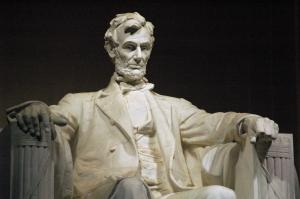
Honest Abe Lincoln
freed the slaves and won the war
assassinated
| Author Notes | Image from Yahoo Images |
![]()
By Treischel
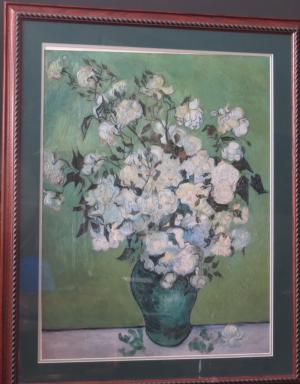
When Vincent Van Gogh, the painter renowned,
Was one of the finest artists around,
His vivid color and his broad brush stroke
Created a style that has never broke,
As still his popular paintings abound
To yet amaze, to delight and astound.
Artistic visions were brilliantly clear.
Until that day that he cut off his ear.
Then driven by bouts of desperate madness,
His mind was infused with devious sadness,
That caused his death in thirty seventh year.
The utter genius of his works remain dear.
Befitting acclaimed artistic endeavor,
His noble spirit shall remain forever.
| Author Notes |
In addition to my Van Gogh puzzle, Starry Night, my wife owns an actual Van Gogh painting. This is its image. The title of the painting is "Irises". It is one of our proud possessions. I love the greens and blues.
This poem is a sonnet. The photograph was taken by the author on Sunday, February 15, 2015. |
![]()
By Treischel

Pontius Pilate was a Roman known for the words he said
At monumental meeting with the Lord, the bible read.
"Are you the King of the Jews?" was his question, venom baited.
"Truth, what is truth?" he responded to what Our Lord related.
"I can't find a fault in Him", had this Prefect rightly stated,
But Jesus was a person that the Jewish leaders hated,
And long before this time, Messiah's future had been fated.
"Shall I release this Jesus, or Barabbas in his stead?"
While people shouted "Jesus is the one we wanted dead".
Reluctantly, "Crucify Him", were words disciples dread.
"I'm innocent of this man's blood", he washed his hands instead.
"See here the King of Jews", words Pilate nailed above His head.
What kind of man this Pilate was? A sinner or a saint?
He knew Our Lord was innocent, but killed Him anyway.
His soul forever tormented with unforgiven taint?
Did he not care a whit of qualm, or come to rue the day?
The answer lays within the torrid tales his legends paint.
This man, born in Besenti, Gov'nor of the Jewish state,
has complicated endings the Apocrypha relate.
Notoriously ruthless, he's the cause of much complaint.
So much, an angry Caesar took this Prefect's rule away.
Before the Emperor Caligula, forced to acquaint.
Beheaded or exiled to Gaul, the historians say.
What happened to his body is enough to make one faint.
They say it never decomposed or even got decayed.
The tale of its disposal really wasn't as expected.
They tossed it in the Tiber, but his handlers got dismayed.
The waters boiled, the spirits raged, his body was rejected.
They took it to the Rhone, where waters once again forbade.
It seems that body, cursed by God, remains always convicted,
Confined to chilly torment, where it can never be displayed,
In cold deep waters at Lucerne his body stays protected,
Waiting silently below, its final Judgment is delayed.
Instead it must perform the righteous punishment elected,
Emerging to wash his hands again, to have his guilt allayed.
On Good Friday, that very day our Jesus was convicted.
To wash his hands, to wash his hands, he stands in shoreline mud
Beseeching once again "I'm innocent of Jesus' blood".
| Author Notes |
I was curious about whatever became of Pontius Pilate, so I looked it up. Wikipedia has an excellent coverageof him. It seems there is confusion about his birthplace: Besenti in central Italy, Frontigall in Scotland, Tarragona in Spain, or even Forchheim in Germany. They were all places occupied by Rome. His death and final resting place is even more intriguing. When his mentor Tiberius died, he was recalled to Rome by Caligula in 41AD for a hearing into all the problem issues that his harsh leadership caused. Some say he was striped of his rank and exiled to Gaul, where he committed suicide. Other insist he was beheaded and his body was thrown in the Tiber river outside of Rome. I recall here a legend from the Mors Pilati (Death of Pilate, an Apocrypha text) about that incident. His body may be in Vienne at Pilate's tomb, or at Lucerne in a lake at Mount Pilatus.
The Eastern Orthadox church debated whether or not he should be considered a saint, due to his reluctant role in God's sacrificial plan, but rejected the idea, although they do consider his wife, Claudia, a saint. I attempted to write this poem in iambic heptameter (14 syllables) using some feminine lines. Each stanza has 12 lines. The rhyme scheme is complex and mixed: aabbbbbaaaaa cdcdceedcdcd fgfgfgfgfgfg hh. This picture was taken by the author of a water bowl with drips agitating the water on July 21, 2012. |
![]()
By Treischel

"Then crucify him," Pilot said.
"I wash hands of his blood."
"Before the day's out he'll be dead,"
Saluting as he stood.
"May God forgive them," Jesus prayed
As on his shoulder, cross was laid,
Beginning then, His death parade,
'Gainst evil for the good.
The soldiers whipped him viciously.
"Move on," they ordered Him.
To kill him expeditiously
At Jewish public's whim.
The thorns lay heavy on His head.
Blood trickling, slowly, as He bled,
Into His burning eyes it led.
It made His vision dim.
This man condemned, the soldiers knew
Was innocent of sin.
It mattered not, he was a Jew,
And Fate's commands were in.
On cobbled road He bore His load.
The whole world's sins to Him bestowed,
To mitigate that debt we owed,
So healing could begin.
Centurions controlled the crowd
That gathered on the way,
As several cursed and shouted loud,
"Let's watch Him die today!"
Then Jesus stumbled under weight
Of cross and crowd's debate,
And then He slipped upon the grate,
Where refuse washed away.
A Roman guard saw he was weak,
And forced a passer-by
To aid the prisoner's physique,
And progress rectify.
Veronica then wiped His face.
Upon the cloth, blood left its trace,
As soon, the group resumed the pace,
Where pain and nails stood by.
Efficiently the Romans made,
Of wooden beams that crossed,
A platform, where condemned were laid,
Their garments stripped and tossed.
Then Jesus spread His arms out wide.
And then to elbows, ropes were tied,
As hammers to the nails applied,
More Precious Blood was lost.
Now soldiers in a different role,
Griped firm the cross and brace
As cross was lifted to the hole,
And dropped into its place
His mother and His friends were there.
As Christ was lifted in the air,
Their thoughts were turned to deep despair,
As sorrow filled the space.
That day they nailed and hung up three,
On hill called Golgotha.
They did their jobs proficiently,
To evil crowd's "Hurrah!"
One cursed Him, "Save yourself and us."
But one, "Remember me, Jesus."
He turned and then responded thus,
"With Me your soul I'll draw."
A sign was posted, "Jewish King,"
Or something on those lines.
The guards remembered everything
To advertise their crimes.
Beyond the pain where joints might burst,
The sun exposure was the worst.
Then Jesus cried out loud, "I thirst."
They fed Him bitter wine.
The Romans gambled for His clothes,
A token for their toil,
And boredom too, you might suppose.
"To victors go the spoils!"
Then as He hung there on that tree
He uttered out a painful plea,
"God, why have you forsaken Me!"
It made the crowd recoil.
The guards turned back to crowd control.
Their tasks they didn't shun.
To them the punishment they dole,
Is just a job well done.
On cross as pain was coming through,
Forgiveness made surprise debut,
Because "They know not what they do,"
Some hardened hearts were won.
"Let's hurry up and get this done,
Let not this action sour."
The Jews asked the Centurion.
"Our Sacred Sabath hour."
"It is finished." Did they hear it?
Whispering, He didn't fear it.
"To YOU, I commend my spirit."
As evil spirits cower.
Attention turned to darkened sky.
This crowd must be dispersed!
The soldiers rushed to help them die,
With spear His side was pierced.
When finally, to heaven's host,
As final sacrifice, foremost,
Christ Jesus then gave up His ghost.
Earth quaked as dark clouds burst.
| Author Notes |
Although not everything is in perfect sequence, or verbatim, I wanted to capture the essence of Christ's crucifixion. I used this format because it allows for a two part perspective. On the one hand I wanted to portray how, to the Romans, it was just another day at the office. To the general crowd, it was a hate spectacle, and to Christians it was profound.
Please note that where non-Christians were speaking about Christ, or the stanza reflected pagan thought, I did not capitalize references to Jesus in such words as He or Him. This reflects how they considered Him. This poem is a Pantygynt. This is a new form created by none other than our very own Pantygynt. The meter is iambic, either tetrameter or trimeter, and each stanza consists of three parts: a Quatrain of alternate rhyme (abab) with 8-6-8-6 meter, a Tercet rhyming ccc, with all tetrametric lines, and a single concluding trimetric line rhyming b. This grouping creates a Cycle. My poem contained 12 Cycles. I did have one Tercet that was trochaic tetrameter. The picture is from Yahoo Images. |
![]()
By Treischel
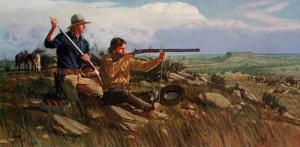
I. How it was.
The buffalo, once princes of the plains,
a shadow now, where mighty herds had reigned.
As destiny conspired 'gainst their domains,
'til only few survivors have remained.
Back then they roamed in thund'rous, dusty clouds,
where sixty million strong owned middle earth,
on open prairie grass, 'twas never plowed,
and Indians all knew their sacred worth.
The bison's meat was very low on fat,
but full of protein's life-sustaining force.
Their furry hides made blankets, belts, fur hats,
plus coats, warm boots, and mittens too, of course.
In fact, for natives, nothing went unused:
the organs, brains, all bones, and even guts.
They made nomadic life richly infused,
with buffalo trail ruts among their huts.
It's here where tragic destiny may show,
I've lived a life of hunting buffalo.
<>
II. My story
I've lived a life of hunting buffalo,
and later I became ashamed of that,
but early on in life it wasn't so.
I couldn't see the future, were I sat.
My given name is simply Matt Montana,
whose family crossed through the famous GAP,
then settled Tuscaloosa, Alabama,
to farm the land, but also hunt and trap.
'Twas eighteen forty three when trouble struck.
My Pa was out there sweatin' in the field,
mosquito ridden lowland full of muck,
when backache, headache, fever was revealed.
It went away, but then came back instead.
It caught my Ma, my sister, brother too.
Within a month, my family was dead,
and I was left there, wond'rin' what to do.
I figured that, to leave there was the best.
With Pa's Kentucy rifle, headed West.
<>
III. Going West, the Sighting
With Pa's Kentucky rifle, headed West.
I also had his trusty Bowie Knife.
These things would guide my life, I can attest.
For fickle are the winds that rule a life.
I walked all day, found shelter every night.
Then met a friend named Alan on the way.
We followed wagon trails in easy sight.
Saw most majestic scene on one fine day.
From top of hill, we spotted endless herd
of buffalo, that ran in thund'rous roar.
From South to North, their bovine bodies blurred.
For day and night they passed by, by the score.
I never seen such numbers here before.
They left a great impression on my mind,
a dazed amazement, at my very core,
a stirrin' in my soul, yet undefined.
I shot one at the back of the stampede,
An action that forever set the seed.
<>
IV. Gettin' to Kansas
An action that forever set the seed,
a taste of something barely known to me.
Unwary as to where that taste may lead,
we traveled on, 'til we reached St. Louie.
From there we worked a paddleboat to Kansas,
as stokers, shoveling coal into the fire.
Fort Leavenworth had promised some bonanzas,
for those who shoot the buffalo for hire.
They needed meat to feed the hungry troops.
So with a borrowed wagon and my gun,
we found a herd, and shot a couple groups,
providin' bison food for everyone.
That gave me a good living for a while.
I sold my gun, but won one playin' cards,
now I hunt buffalo in frontier style,
My Sharpes can shoot them from three hundred yards.
In sixty two, the railroad barons came.
Then wholesale slaughter soon became the game.
<>
V. The Railroads
Then wholesale slaughter soon became the game.
Oh sure, they needed meat to feed the crew,
but endless herds on tracks were most to blame.
We started killin' thousands, not a few.
The railroads made a carnival of it,
where train cars left their windows down to shoot
at herds, while leavin' carcasses to sit,
and rot there in the sun, along the route.
Now I became a well-paid hunting guide,
who takes large groups to shoot with wanton care.
They only want the skull, the horns, and hide.
They leave the rest decayin' everywhere.
In sixty five, the Civil War would end.
Now Sherman, Grant,and Sheridan would act.
Without the bison herds, the tribes would bend.
Make buffalo extinction now a fact.
From here, the prior death toll number pales.
They authorized the kill on greater scales.
<>
VI. The Great Slaughter for Fun and Profit
They authorized the kill on greater scales.
I found myself enamored by the pitch.
At twenty five gold bucks for hides, in sales,
and seventy five cents per tongue, I'm rich!
See, Bison have a quirk, when one is shot,
the others stand, not knowing what to do,
so in a day, I can shoot quite a lot,
about two fifty with my skinnin' crew.
That's sixty five cool hundred dollars cash,
a fortune in this certain century.
Enough to make too many marksmen dash,
to earn a wage at this activity.
And there were even betting contests held,
to see which hunter could kill off the most.
They'd shoot until their barrels nearly melt.
The plains became a place of bison ghosts.
The natives lost what tribes depended on,
By eighty five, the buffalo were gone.
<>
VII. Aftermath
By eighty five , the buffalo were gone.
I lost my source of livin' once again.
The plains were now a charnel field of bones,
and filled with bored and idle riflemen.
But then, redemption came through from the East,
as fertilizer came to great demand,
while lying there were sundried bones of beast,
to gather free, as plentiful as sand.
We shot the bison, tamed the indians,
shipped trains of bones out eastward by the ton,
a blow to beasts and Homo Sapiens.
I'm sad to say, that's how the West was won.
So, write about the slaughter, misery.
I'm Matt Montana, that's my given name.
Remember, when you give my history,
our nation, whole, bares both the blame and shame.
Of those vast herds, a tiny few remain.
The buffalo, once princes of the plains.
<>
| Author Notes |
I felt the story of the Great Buffalo Slaughter should be told. There once were two large herds of buffalo that roamed across the Great Plains of the United States. The estimates range from 40 million to 60 million, at their peak. That is about 20-30 million in each group. It is said, that it would take as many as 2 days for the herd to thunder past. By the time the slaughter was complete, there somewhere between only 400 and 1200 bison left.
The Gap - I was referencing the Cumberland Gap that was discovered by Daniel Boone, allowing Western expansion across the Appalachian mountains. In the 1840's there was a Yellow Fever epidemic throughout the southern United States, that killed thousands. The early symptoms were: a backache with a headache followed by a fever that lasted 5-6 days, after which the patient may recover. But if there was a relapse, they would die. The Kentucky, long barrel rifle, was the main US made rifle in the early colonies. It helped win the revolution. The gun was a flintlock made by German immigrants around Philadelphia. It fired a 44 caliber ball that was accurate to about 200 yards, max. It could easily pull down large game. Bowie Knife - a large hunting knife popularized by Jim Bowie. Stokers - men who shoveled coal into steam engine boilers. Fort Leavenworth, Kansas, was located in a strategic area for westward expansion, being along the major wagon trails, as well as on the Missouri River. Bonanza - a rich source of income, usually attributed to mining. Sharpes Rifle - the quintessential buffalo hunting rifle. It was a carbine, accurate to 300 yards (some claimed to 400 yards). It used a 55 caliber cartridge. Usually used with a tripod. Also known as Beecher's Bibles, when 500 were shipped to St. Louis in boxes marked as "Bibles." After the civil war, the war with the Plains Indians, began in earnest. The US Army had been unsuccessful in beating the tribes in skirmishes. General Sherman determined that the best way to defeat them was to eliminate the buffalo upon which their entire society was based. He said that it was better and easier to kill a bufflo, than an Indian. In 1875, General Sheridan went before congress and asked that the elimination of the bison continue, as that had done more to tame the Indians than 40 years of battling them. That same year, President Grant pocket vetoed a bill to stop the extinction. $6,500 in 1865 is about $100,000 today. We're I come from, route rhymes with shoot. For this poem I did you a few lines of feminine iambic meter. This picture is from yahoo images. |
![]()
By Treischel
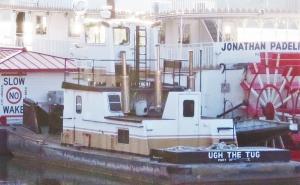
Its moniker is - Ugh the Tug -
Whose engines chug within the bay
His whistle blows, he'll chug-a-lug,
To push the barges down the way.
Whose engines chug within the bay,
A powerful force for his size.
To push the barges down the way,
The large long load a big surprise.
A powerful force for his size.
He'll manage twelve in double file,
The large long load a big surprise.
The sight might cause a silly smile.
He'll manage twelve in double file,
So small for such a tough ordeal.
The sight might cause a silly smile,
With captain smug behind the wheel.
So small for such a tough ordeal.
His whistle blows, he'll chug-a-lug,
With captain smug behind the wheel.
Its moniker is - Ugh the Tug.
| Author Notes |
Of course I had to write a poem for this one. That name just tickles my Muse. I spotted this little tugboat parked along the Mississippi river in St. Paul. I've seen it pushing huge strings of barges, although this day is was idle.
This poem is a Pantoum. A Pantoum is a poem that is made up of quatrains with interweaving repeated lines. In that sense, the Pantoum is a form of poetry similar to a Villanelle. It is composed of a series of quatrains; the second and fourth lines of each stanza are repeated as the first and third lines of the next. This pattern continues for any number of stanzas, except for the final stanza, which differs in the repeating pattern. The first and third lines of the last stanza are the second and fourth of the penultimate; the first line of the poem is the last line of the final stanza, and the third line of the first stanza is the second of the final. Ideally, the meaning of lines shifts when they are repeated although the words remain exactly the same. So, although they are the same words, their meaning is changed. this gives the poem it's intrinsic beauty. A four-stanza pantoum is common,(although more may be used) and in the final stanza, you could simply repeat lines one and three from the first stanza, or write new lines. The pantoum outline is as follows: Stanza 1 A B C D (or A C B D) Stanza 2 B E D F (or C E D F) Stanza 3 E G F H Stanza Stanza 4 G I (or A or C) H J (or A or C) No specific meter requirement is identified. I wrote this one in iambic tetrameter. This photograph was written by the author himself on March 6, 2016. |
![]()
By Treischel

A willow greets the fading sun,
the day near done, with arms stretched wide.
A wooden maiden, torso spun,
begun when silhouettes subside.
She weeps her greenest tear-dropped leaves.
She grieves the final warm embrace.
A trace of sun, as willow weaves
achieve a golden veil, with grace.
She poses in that hidden vale,
proud Dryad goddess of the green.
Eurydice, seen in father's trail,
a female form in dance, serene.
Her branches raised in fifth en haut,
so taut, she holds at full arret,
leaves set in braided green and gold,
behold this willow's wild ballet.
| Author Notes |
This poem is an Animated Still. Animated stills are poems where inanimate objects take on human, animal, or spirit forms, traits, or articles. They are derived from Photographs I have taken, that have moved me to write a poem associated with it. They require a close look at the photograph, and some imagination, to spot them. In this case, focus on the trunk of the tree. I see a set of crossed legs that instigate a female form with arms raised. The left arm is bent at the elbow. Hope you see it too. The photo was taken just before sunset, when the sun was low and the shadows are long.
Dryad - In Greek mythology, the Dryads are female spirits of nature (nymphs), who preside over the groves and forests. Each one is born with a certain tree over which she watches. A Dryad either lives in a tree, in which case she is called a hamadryad, or close to it. The lives of the Dryads are connected with that of the trees; should the tree perish, then she dies with it. If this is caused by a mortal, the gods will punish him for that deed. The Dryads themselves will also punish any thoughtless mortal who would somehow injure the trees. Euridice, - (pronounced you-RI-dike), was an oak nymph or one of the daughters of Apollo (the god of music, prophecy, and light, who also drove the sun chariot, 'adopting' the power as god of the Sun from the primordial god Helios). Thus my reference to wanting a final warm embrace in her father's trail. En Haut - is a reference to a ballet arm position, where the arms are raised with one arm bent at elbow pointing up, and the other tailing out from the shoulder behind. Arret - a french term used in ballet meaning to hold position in a long pause. This format is a Modified Awdl Gwyd., wherein the inline rhyme's position floats, and the syllable count changes from 7 to 8. This poem is written in iambic tetrameter where the rhyme in lines 1 and 3 are repeated in line 2 and 4. So the rhyme scheme is a,ab,a,ab - c,cd,c,cd - e,ef,e,ef - g,gh,g,gh. This photograph was taken by the author himself on July 17, 2016. |
![]()
By Treischel
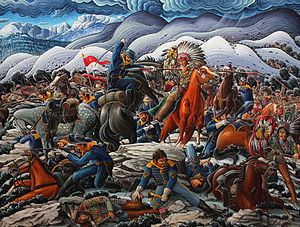
“Give me 80 men, and I can ride through the whole Sioux Nation.”
| Author Notes |
My poem does use some feminine iambic lines.
Brevetted - a battlefield promotion, Fetterman went from Lieutenant, to Lieutenant Colonel during the war. Annual Sum - The treaty of Fort Laramie promised $50,000 annually to the tribes, forever, but Congress shortened the term to 10 years. Most of the money never reached the tribes. Sundry - several, diverse, various. Recoup - regain, gain back (Fetterman√????√???√??√?¬¢??s war glory) Adage - proverb, wise saying, wise addition Most people have heard of Custer's Last Stand at the Battle of the Little Bighorn, but Fetterman's Fight was an earlier and a larger disaster. The Fetterman Fight, also known as the Fetterman Massacre or Battle of the Hundred-in-the-Hands, was a battle during Red Cloud's War on December 21, 1866, between the Lakota, Cheyenne, and Arapaho Indians and soldiers of the United States Army, based at Fort Phil Kearny, Wyoming. The U.S. military mission was to protect travelers on the Bozeman Trail. A group of ten warriors, including the later-legendary Crazy Horse, acted to lure a detachment of soldiers into an ambush. All 81 men under the command of Captain William J. Fetterman were killed by the Indians. At the time, it was the worst military disaster ever suffered by the U.S. Army on the Great Plains. Note that the year 1866 was just one year after the end of the Civil War. Although an Infantry Unit, Captain Fetterman was part of a Calvary detachment. In June 1866, Colonel Henry B. Carrington advanced into the Powder River country, to protect emigrants traveling west along the Bozeman Trail. He build 3 forts, and headquartered at Fort Phil Kearney. During their construction, he suffered about 50 Indian attacks, losing a total of more than 20 soldiers and civilians Carrington had 700 soldiers and 300 civilians in his command. A Cavalry unit was dispatched to him then from Fort Laramie, which included Captain Fetterman. Although he had no experience fighting Indians, Fetterman criticized Carrington's defensive posture and expressed contempt about the Indian foes. He allegedly boasted that statement at the top.Many other officers shared Fetterman's feelings and a mutinous mood was beginning to prevail. Source: Wikipedia. Red Clouds statements were paraphrased. The rest of the story is told in my poem. This poem is a Crown of Heroic Sonnets. The Crown of heroic sonnets is a sequence of seven Heroic Sonnets usually addressed to one person. It is concerned with a single theme and each Sonnet explores a different aspect of the theme and is linked to the preceding and succeeding sonnets by repeating the final line of the preceding Sonnet as its first line and by having its final line be the first line of the succeeding Sonnet. The first line of the first Sonnet is repeated as the final line of the final Sonnet thereby bringing the sequence to a circular close. A Heroic Sonnet is an iambic pentameter based poem that adds a heroic couplet to either two Sicilian octave stanzas or four Sicilian quatrain stanzas. In other words, it's eighteen lines of iambic pentameter broken into three or five parts with the last part being a couplet. The rhyme scheme has usually been: a,b,a,b,a,b,a,b - c,d,c,d,c,d,c,d - e,e (three parts) OR a,b,a,b - c,d,c,d - e,f,e,f - g,h,g,h - i,i. (five parts) I chose the latter. Photo as annotated. Figure 1. Kim Douglas Wiggins' study of the Fetterman Fight, early 21st century. |
![]()
By Treischel
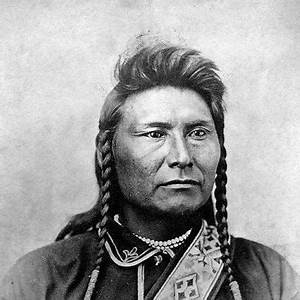
The sounds of battle echo through the Mountains,
resounding off the cliffs of Yellowstone,
from fighting for their tribe's very survival,
were warriors of the native clan, Nez Perce.
The year they fought was eighteen seven seven.
Just after Custer met his final fate.
The tribe was fleeing north to Canada,
where Sitting Bull escaped United States.
The fighting raged from June into October,
through several sets fought fiercely in retreat.
It covered over some one thousand miles.
The final battle lasted five fierce days.
At Snake Creek, in Montana's Bear Paw Mountains,
the sounds of anguish echoed through the hills.
Just forty miles distance from the border,
Chief Joseph ceded fate to General Howard.
"I'm tired of fighting, war chiefs are all killed. "
"People, hear me!" said worn and grizzled Chief.
"I'm sick and sad; will fight no more forever. "
So with that, the Nez Perce clan surrendered.
Their battle tactics soon became renowned
The nation was impressed by their finesse.
And even Sherman marveled at their conduct.
Chief Joseph's words went down in history.
" I Will fight no more forever."
| Author Notes |
This is a sad story of a fierce, proud people that fought against all odds, but finally surrendered just short of their goal. Even with the accolades mentioned on their bravery and tactics, it didn't stop them from being arched to Fort Leavenworth, Kansas and ultimately a reservation in Oklahoma.This, after being promised they would be returned to their homeland in Idaho upon surrender.
This poem is a Blank Verse which is an unrhymed series of quatrains written in iambic pentameter. I did employ some feminine iambic lines. Picture from Yahoo Images. |
![]()
By Treischel

Fetterman’s Fight (Crown of Heroic Sonnets) Oh what a tale of bluster going bad! Lakota dubbed, “One hundred in the Hand.” is battle that a Captain Fetterman had. The prequel to George Custer’s famous stand. It happened late in eighteen sixty six, quite near the Fort along the Bozeman Trail named after Philip Kearney’s politics (since often martial heroes' names prevail). Where seven hundred soldiers guard the path that wagon trains all take to Oregon, a flippant quip left tragic aftermath ‘bout native strength the troops would come upon. The Captain, veteran of the Civil War, distinguished battle vet, twice brevetted for gallantry, had confidence galore. His fatal words would soon be edited. Had Fetterman just listened, once deployed, it would have been so easy to avoid. It would have been so easy to avoid. But Fetterman considered he’s a better man than cautious Colonel keeping him annoyed since when this new assignment first began. However, this all started years before with treaties signed to settle native claims. Nine tribes agreed to passage safe restore for settlers traveling over tribal plains. The Laramie Treaty signed what should be done Horse Creek was where all the tribes had come September First of Eighteen Fifty One gave fifty thousand as an annual sum. The tribes were promised their sacred Black Hills and other traditional tribal lands, but agents often withheld dollar bills, gold miners ignored the treaty’s commands Illegal settlers would build towns and farms, No wonder warriors taking up their arms. No wonder warriors taking up their arms With endless invaders wherever you go, To make matters worse were endless alarms that many were killing off their buffalos. Chief Red Cloud questioned loud this awful threat Lakota Council hears his outraged speech. “Did White Father, their leader, soon forget the promises signed papers witnessed preach?” “A pathway to pass through our hunting grounds so iron horses can go to the sea, our sacred grounds were to stay out-of-bounds so wagon trains can travel hostile free.” “And they were not to tarry long with us, but now build forts and settle on our soil. To kill the buffalo is treasonous! From evil deeds our people must recoil.” “This surely is not what we bargained for. So listen my Dakotas, I’m for war.” So listen my Dakotas, I’m for war.” With those bold words began the war’s attacks of Bozeman Trail forts warriors most abhor supporting Red Cloud’s rhetorical climax. Foremost Fort Kearney, target of their rage, where Colonel Covington was in command as cautious leader, not one to engage. Subordinates soon didn’t understand. He’d send patrols supporting the woodcutters with orders to avoid passing the ridge because was out of sight of trouble spotters upon the rampart’s observation bridge. There’d been some sorties and small skirmishes. Reports said native camps were pitched nearby. Then several warriors made war-like flourishes. Smoke signals sent up warnings in the sky. While in the fort repressed emotions ran, and here began the tale of Fetterman. And here began the tale of Fetterman, that fearless leader of a mounted group, with eighty one within his caravan prepared for battle honors to recoup. When dozen woodcutters now under siege, he volunteered to lend required relief. The Colonel ordered loud a cautious adage, “Relieve, do not pursue.“ His message brief. Here Fetterman set forth his fatal quote. “Just give me eighty men and I’ll ride through the whole Sioux Nation,” Papers later note. Then flourished a salute in smart adieu. With that the sentinels opened the gate while flashing colors galloped through in haste. So heedless warnings, went unto their fates. A useless tragedy of human waste. Brave soldiers sent to fight a deadly dual, were unaware their leader was a fool. Were unaware their leader was a fool, who took them straight into a well-laid trap, Where lessons learned can be so very cruel, with overwhelming odds the handicap. For Red Cloud had about one thousand men all well concealed in woods beyond the ridge. As decoys, Tribes selected only ten, with Crazy House’s courage as their edge. The plan, to have the decoys be exposed, to taunt the soldiers into giving chase. beyond the ridge where they would be enclosed and overcome by numbers that they’d face. Now, woodcutters were working in the pines to gather wood for cooking and for warmth, accompanied by troops as their life-lines, became besieged by warriors from the North. A crisis upon which the plan was hung, and soon the trap was ready to be sprung. And soon the trap was ready to be sprung on Fetterman whose bravery and contempt would bring his eighty one to fight among those very foes he thought he could preempt. While Covington gave orders of restraint the Captains mood was having none of that. When Crazy Horse appeared without constraint, he took the bait and raced into combat. Where there he ate his words in total shock as death surrounded him on every side confronting him with bow and tomahawk. Soon every person with the Captain died. Reports said six died from their bullet wounds, the rest succumbed to ancient injuries. Their bodies mutilated and festooned about, proclaiming battle victories. The worst Great Plains disaster Army had. Oh, what a tale of bluster going bad.
| Author Notes | The Fetterman Fight, also known as the Fetterman Massacre or the Battle of the Hundred-in-the-Hands or the Battle of a Hundred Slain,[1] was a battle during Red Cloud's War on December 21, 1866, between a confederation of the Lakota, Cheyenne, and Arapaho tribes and a detachment of the United States Army, based at Fort Phil Kearny, Wyoming. The U.S. military mission was intended to protect travelers on the Bozeman Trail. A group of ten warriors, including Crazy Horse, acted to lure a detachment of U.S. soldiers into an ambush. All 81 men under the command of Captain William J. Fetterman were then killed by the Native American warriors. At the time, it was the worst military disaster ever suffered by the U.S. Army on the Great Plains. Source Wikipedia. Custers Last Stand occurred in June of 1876, ten years later. By then Fetterman had been long forgotten. |
|
You've read it - now go back to FanStory.com to comment on each chapter and show your thanks to the author! |
![]()
| © Copyright 2015 Treischel All rights reserved. Treischel has granted FanStory.com, its affiliates and its syndicates non-exclusive rights to display this work. |
© 2015 FanStory.com, Inc. All Rights Reserved. Terms under which this service is provided to you. Privacy Statement